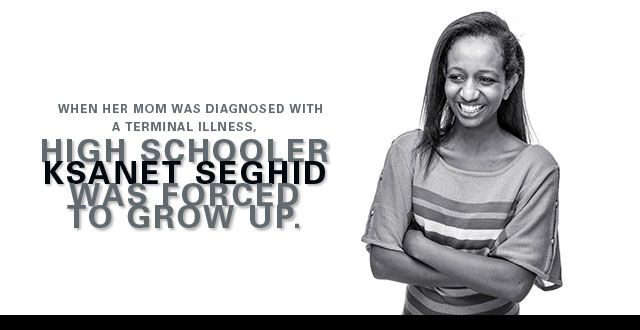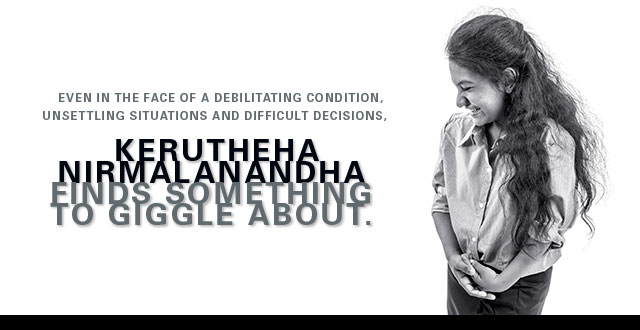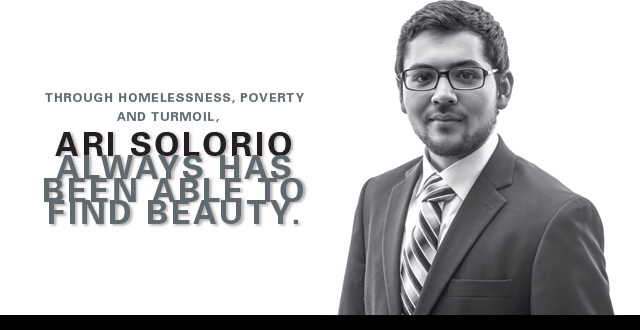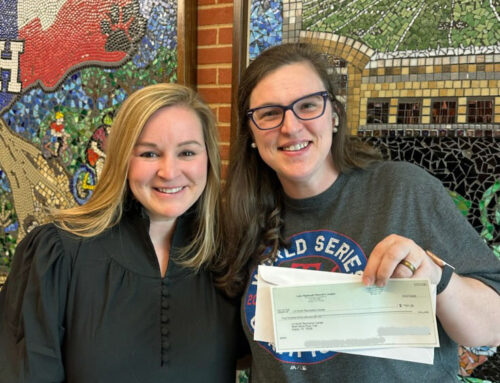Growing up, earning good grades, pursuing a talent and gaining college acceptance is tough, but imagine doing it all in the face of abject poverty or an incurable disability or while you are the primary caretaker for a dying parent and your younger siblings. Such circumstances can become an excuse for teens to escape down a destructive, pain-numbing path. For a few Lake Highlands seniors who will graduate this month, however, hardship is reason to strive for a better future. Their determination, support from teachers and administrators, and, perhaps, the iron-will derived from a fight for survival has driven them to remarkable success.
 At an age when most girls are experiencing a first crush or attempts at lipstick, Ksanet Seghid was emigrating from her country — Eritrea, in the horn of Africa, which was in the midst of political upheaval and religious oppression — to a place where the language and culture were a mystery; she was leaving behind her father and every friend she knew, save her two younger sisters, Bethlehem and Abighail.
At an age when most girls are experiencing a first crush or attempts at lipstick, Ksanet Seghid was emigrating from her country — Eritrea, in the horn of Africa, which was in the midst of political upheaval and religious oppression — to a place where the language and culture were a mystery; she was leaving behind her father and every friend she knew, save her two younger sisters, Bethlehem and Abighail.
Ksanet’s mom was experiencing health problems. A midwife by trade, she had observed first-hand the inadequate healthcare system in Eritrea.
America offered better medical-care opportunities as well as freedom to practice their Pentecostal faith, which was illegal in Eritrea.
So the family entered the Diversity Immigrant Visa lottery, a program to help residents of qualifying countries obtain American residency, and was accepted.
Ksanet’s first American school, in Wylie, Texas, was a nightmare, she says.
[quote align=”right” color=”#000000″]“I love writing. I like it because — well, you can talk and get your problems out there, but when you talk to people, they usually say something back, and sometimes what they say doesn’t make things better — when you write, writing doesn’t talk back.”[/quote]“We didn’t know English, and [the other kids] made fun of us — made fun of our accents, made fun of my sister and me when we talked to each other in our language.”
With a sad smile and downturned eyes, she recalls, “They said we were monkeys from the jungle. It didn’t even make sense.”
Things improved when the girls moved to an apartment in Lake Highlands. At more diverse Forest Meadow Junior High, they made friends. And at Lake Highlands High School, Ksanet embraced every academic opportunity possible; she had decided as a child walking the halls of Eritrean hospitals with her mother that she wanted to attend medical school someday.
She enrolled in Advanced Placement courses and joined the track team.
But things unraveled when her mom was diagnosed with bone cancer.
Teenage Ksanet became her family’s main caretaker. She supervised her sisters, cooked, kept house and nursed her mom. Members of their Eritrean Baptist Church helped the family the best they knew how.
But Ksanet cries when she recalls the day church members rushed her mom off to the hospital and refused to tell her what was going on.
“They thought they were protecting me from something, so they would not tell me anything. Then, when I finally saw what had happened, I was shocked.”
Doctors had amputated Ksanet’s mother’s leg.
From there, things only got worse. “She got so skinny,” Ksanet says, her voice cracking.
“She went from this beautiful woman to [long pause] a skeleton. Her hair fell out,” says Ksanet, absently touching her own thick locks. “She couldn’t work or even move, or anything.”
The next year was the worst. Her mom was bedridden, swollen from head to toe; she could not so much as use the bathroom on her own.
The girls longed, emotionally, for their once strong and vibrant mother.
“My sisters missed her and wanted to talk to her, but she was so tired and sometimes couldn’t speak at all.”
Last year a hospice nurse began coming to their apartment, “but only in the mornings, like to change sheets,” Ksanet says; someone had to be with her the rest of the day. During that period Ksanet spent two school days a week at home and missed all her track meets. She says school administrators understood the situation and made arrangements regarding attendance. A neighbor/church member came the other days. On those days, Ksanet attended classes and track practice, then came home and cooked, and finally studied from 10 p.m. to 1 a.m.
Just when Ksanet thought she would break, her father appeared, having acquired a temporary visa.
It was a godsend, Ksanet says. “I just don’t know how I would have gotten through it without him,” she says.
Ksanet’s 44-year-old mother died on a Sunday morning in winter 2013.
Ksanet had to stifle her own pain as she consoled her sisters.
“I tried to act OK, to look strong, for them,” she says. “But I did not feel OK. I was really, really sad.”
Her father, the church and Lake Highlands High School personnel sustained Ksanet.
“I nearly failed the six weeks when my mom died, but my teachers helped me. My counselor Shannon Rodriguez would sit and listen to me; I could talk to her. I had friends now at school, who also went to my church, and they prayed with me. My mom and dad had introduced me to my faith, and it is what brought us here. I know if I did not have it I would not have hope. And I know my mom was comforted by faith, too. She knew she was going to go. I heard her sing and pray to God to accept her soul a few days before she died.”
Running and writing also provide Ksanet some relief.
Though she didn’t know a word of English a few years ago, it now is one of her favorite subjects, thanks to inspirational teachers such as coach Misty Benson, she says.
“I love writing,” she says. “I like it because — well, you can talk and get your problems out there, but when you talk to people, they usually say something back, and sometimes what they say doesn’t make things better — when you write, writing doesn’t talk back.”
Benson says the idea of being an inspiration to Ksanet is gratifying but backward.
“It is she who inspires me. To be the family caretaker, deal with the loss of a parent and still work so hard in rigorous classes — and mine is tough — is extraordinary, but Ksanet is also such a sweet, sweet girl,” Benson says. “She has always been so polite and shows her beautiful smile when she comes into your room or when you pass her in the hallways. Ksanet is that real-life example of someone who is beautiful both inside and out … she has persevered through all odds with such grace and poise — it brings tears to my eyes just thinking about it.”
Ksanet continued improving academically. Joining the AVID organization her senior year helped her navigate the world of college and scholarship applications, entrance exams and financial-aid paperwork, among other things, she says. She recently was accepted to Texas Women’s University, where she will enroll in the nursing program.
“I want to be like my mom. She used to take me with her to the hospitals. I saw people needing help. She told me how badly doctors and nurses were needed. At first I thought I would become a doctor and then go back to Eritrea, but now I know they are needed in many places, like Parkland Hospital.”
Ksanet says she had many conversations with patients in the beds next to her mom’s during stints at Parkland. She sometimes wrote about their stories in a private notebook, she says.
After graduation, when the time comes to move to the college campus, Ksanet and her sisters will miss one another. But Ksanet says she knows the best thing she can possibly do for them is pave the way.
“Like my mom always said, do not make any excuses — an education is the most powerful tool we can obtain.”
One of Ari Solorio’s most poignant pastel sketches depicts a male figure huddled inside a closet. Colorful garments shroud the subject’s face and shoulders; lanky arms clutch knees against chest. Depending on the observer’s take, the scene might illustrate an evasion of some domestic horror or merely a child partaking in a game of hide-and-seek.
Ari says he usually doesn’t try to explain his work; he just lets it “speak for itself.”
He does expand on one aspect of the piece — a striped dress-tie hanging from the inside door. “Things like ties, razors — like shaving — those are important to me. I know it is a silly thing, but since my dad wasn’t around, learning to tie a tie or to shave was a big deal.”
At age 7, living in Guadalajara, Jalisco, in Mexico, Ari spent most days unsupervised, caring for his toddler brother while his mother tried to find work. For months on end, he says, they were homeless and slept in cars. Ari’s mother, Mireya Enriquez, an American citizen, finally decided to flee his violent father and the rest of the insufferable situation in Mexico.
[quote align=”left” color=”#000000″]“The biggest form of discrimination is that people naturally have low expectations of you. I feel like I have to work extra hard to change the perception.”[/quote]They relocated to the Dallas area when Ari was 8, but things weren’t easy here, either. They stayed with family when they first arrived, which meant eight people in a one-bedroom apartment, he says. His mom worked retail, but she moved from job to job, and they moved from one apartment to another, thus from school to school, during the first two years. Ari cannot even recall the number of schools he attended. “It was a lot,” he says with an uneasy laugh. At the time, he spoke no English.
English as a Second Language (ESL) classes helped, but he says he effectively isolated himself from other people until high school. Through art, and eventually through playing the violin and viola, Ari expressed himself.
“In Mexico, I didn’t have TV or Xbox or toys. I did have a pen and paper. So when I was alone, I would draw. Art and music takes me out of all the things that have happened. A lot of things that normally matter don’t matter when I am drawing. Rent is due, we don’t have any money — maybe it doesn’t make sense, but art helps. When I couldn’t communicate well with people, because of my English, I could draw or play the instrument.”
Orchestra and high school Advanced Placement classes helped Ari “get out of his comfort zone,” he says, and build confidence. And art contests — such as that of the national PTA School of Excellence program, which he won his sophomore and senior years — as well as teachers and other students, began validating Ari’s artistic abilities.
Serious creative endeavors, however, are expensive. Ari says his mother went to great pains to buy him supplies.
“We could never afford to put me on a soccer team, send me on school trips or anything big like that, but she always tried to support my art, as soon as she saw how serious I was, she worked extra to buy sketch pads, pens, that kind of thing.”
Art teacher Tina Walker helped Ari procure more-advanced art tools and pushed him toward excellence, he says. “The best thing she taught me and the rest of the class was: ‘You might think you are good at art, but you are not. But if you work hard at it, you can be.’ I needed that, because by that point a lot of people were telling me how good I was. Now I feel like I always need to challenge myself to break new ground with my art.”
Though Ari was settling in socially and academically, the troubles at home continued. His freshman year, Mom told him she had breast cancer. “She had had it for a long time by the time she told me, and once she explained it, so many things made sense,” he says.
Then Ari’s little brother had a cancer scare. “Eventually we learned it was something less serious, but we had to pay for a whole bunch of tests and scans and medical bills,” he says.
Even while taking all AP courses, playing in the orchestra and winning art contests, Ari worked as a waiter to help pay the family’s bills. He also volunteers at Dallas Society of Visual Communications, which allows him free admittance to seminars and workshops, and he is a fund-raiser for MusAid, a nonprofit that helps supply musical instruments to underdeveloped countries. Recently, his mother gained steady employment, and he was able to quit working to focus on exams, and the family even moved into a townhome, where Ari and his brother share a bedroom. It’s the first time he’s ever had his own bed; he’s always slept on a couch.
His GPA is 94.3. And he credits teachers such as Bob Williams (for just finding time to talk to him) and David Wood (whom he thanks for his mastering of English and literature) for his success in the face of challenge.
Wood recalls an essay that Ari wrote for his class. “He not only revealed his considerable compositional skills, but also both his aesthetic sensibilities and how his artist’s soul infuses his responses to life’s vagaries.” Ari’s essay was about his brother’s illness, Wood says, and what most impressed the teacher was Ari’s “keenly analytical and artistic sensibility to do what the best artist’s do: change our perceptions of our human experience.”
Ari was accepted to Savannah College of Art and Design and received more than $11,000 in scholarship money, but he is unable to afford the remaining costs, he says. He expects to have full United States citizenship by the end of the summer, but he now is in the states legally under the Deferred Action for Childhood Arrivals (DACA) law. He is ineligible for financial aid until he is a citizen. Instead, he says, he plans to attend the University of North Texas and study graphic design.
While he has never experienced direct prejudice as a result of his ethnicity or socioeconomic status, he says, he has noticed that people seem to expect more out of wealthier, American-born kids.
“The biggest form of discrimination is that people naturally have low expectations of you. I feel like I have to work extra hard to change the perception.”
Graduation, he says, will be bittersweet.
“I kind of feel like I just found a home here,” he says with a grin. “Now I have to go be the new guy again.”
 Introductions begin with a struggle and awkward laughter. It is the norm, she says. Her name — Kerutheha Nirmalanandha — is difficult to pronounce, even after she has repeated it for you multiple times. Like most other challenges in her life, she meets the situation with a gleaming smile and a joke.
Introductions begin with a struggle and awkward laughter. It is the norm, she says. Her name — Kerutheha Nirmalanandha — is difficult to pronounce, even after she has repeated it for you multiple times. Like most other challenges in her life, she meets the situation with a gleaming smile and a joke.
“You should see what standardized tests are like for me,” she says. “Everyone else has finished, and I am still filling out the name section.”
When she was born in Sri Lanka, Kerutheha was practically asphyxiated by the umbilical cord; the incident caused permanent damage in the form of cerebral palsy. The first hint of a temper rises as she talks about it. Looking down at her frail left arm resting in her lap, she says, “This — this was a doctor’s fault.”
[quote align=”right” color=”#000000″]“I was obsessed. I cut out every article I found about the space program, astronauts, missions. People said, ‘How are you going to even get to NASA — it is in the United States, and you are here?’ I did not care. I dreamed about it.”[/quote]“The cord that attaches the baby, it got tied around my neck. The doctor told my parents I was dead. There was then a chief doctor that came and gave me oxygen and revived me,” she says. “Everyone was happy, but … ” Kerutheha says the doctor gave her an injection in her arm that left the limb completely immobile.
Today she has no use of her left arm, her whole left side is feeble, and her heartbeat and lungs are labored, so she cannot participate in strenuous activity.
In lieu of physical activity, she fantasized about someday working as a scientist at NASA, she says. “I was obsessed. I cut out every article I found about the space program, astronauts, missions. People said, ‘How are you going to even get to NASA — it is in the United States, and you are here?’ I did not care. I dreamed about it.”
Her family moved to New Jersey when she was 12. What was it like moving from Sri Lanka to Jersey? She shakes her head, closes her eyes and finally says, “not good.” At first, she explains, she was very excited about moving to America — land of opportunity, and NASA, where doctors might even be able to treat some of her more severe cerebral palsy symptoms.
“But when I got there — oh my, I was so scared. I cried and cried and screamed! It was bad. Every day was like a nightmare. There were drug dealers on the street when I walked home. Every day I thought, ‘I am dead.’”
She says the worst of the problems had nothing to do with other people, though. She wasn’t bullied or harassed, really.
“It was within myself. I was scared and isolated.”
Things improved when her father, a teacher, found work in Boston. There she finally made friends and gained self-esteem.
“Math and science were my best subjects. In my country, I was failing math, but it turned out it was because the teachers couldn’t teach. Here, I am like, wow, I can do math, and in fact I am really good at it.”
Then, Dad announced that they were moving to Dallas. It was her sophomore year and she was again alone and confused in a strange place. (Of course, she was now a little closer to Houston-based NASA, she conceded). But the students and staff at Lake Highlands, she says, were nice.
Sometimes cerebral palsy, a brain and central nervous system disorder, causes cognitive problems, but Kerutheha is sharp, and she thrived into Advanced Placement classes. She says she did not necessarily mean to enroll as a sophomore in classes with juniors and seniors — it really was an accident — but it worked out.
Recently she met with a team of doctors at Dallas Children’s Hospital to discuss the possibility of surgery to give her limited use of her left arm. “If it worked, it could allow me to move left and right but not up and down,” she explains. “But there are risks.”
She admits to being petrified because if something should go wrong with the operation, she could suffer more damage, lose the use of her leg or even end up in a wheelchair. She must decide before the year’s end, she says, or she will be too old for the treatment.
She recalls times when, at her old school, though she is a pretty good singer, she was not picked for parts because of her condition. She does not try out for roles these days. But she chooses not to dwell on all those things too much. Instead she concentrates on what she does have — a strong side, a good arm, a sense of humor — and on helping others.
Kerutheha spends a large chunk of time tutoring other students. She says helping others makes her feel normal.
She is generally more confident and self-assured than she once thought possible, and she credits the AVID program and her family. “I feel like I can do anything right now,” she says. She beams when speaking about her parents and teachers — she could never name a favorite.
“I love every one of them,” she says.
She does mention Ms. (Candice) Nichols, who she says never shows any negativity. “She is always positive and radiant,” Kerutheha says.
“That is what I want to be like. Everyone thinks I am always happy, but I am not. I can be serious. It is not good. I have seen myself serious, in the mirror, and I do not like it.”
Nichols says her student is one of a kind — a charismatic and determined dreamer, she says. Earlier this year, she recalls, Keruthrea gave a speech at the Lake Highlands Exchange Club (where she was receiving an award) about how much her parents had done for her and how nothing would stop her from repaying them.
“She wrung our hearts when she talked about how hard they both worked to support the family, and they couldn’t always make ends meet,” Nichols says. “Then she filled us with pride as she described her determination to, ‘do something no one has even thought to do before,’ so that she could buy her parents a big house and a new car and everything they could want … Keruthea is proof that the American Dream is real; she is proof that if you work hard, and keep pushing forward regardless of the obstacles, you can achieve anything.”
After a couple of semesters at Richland, she plans to attend the University of North Texas or the University of Texas at Arlington, where she will study biochemistry and biophysics, and learn skills that will come in handy when she applies to NASA.






